- EasyCard
- Trade
- Help
- Announcement
- Academy
- SWIFT Code
- Iban Number
- Referral
- Customer Service
- Blog
- Creator
A Complete Guide to Renting in Japan: Detailed Explanation of Rental Websites, Costs and Precautions
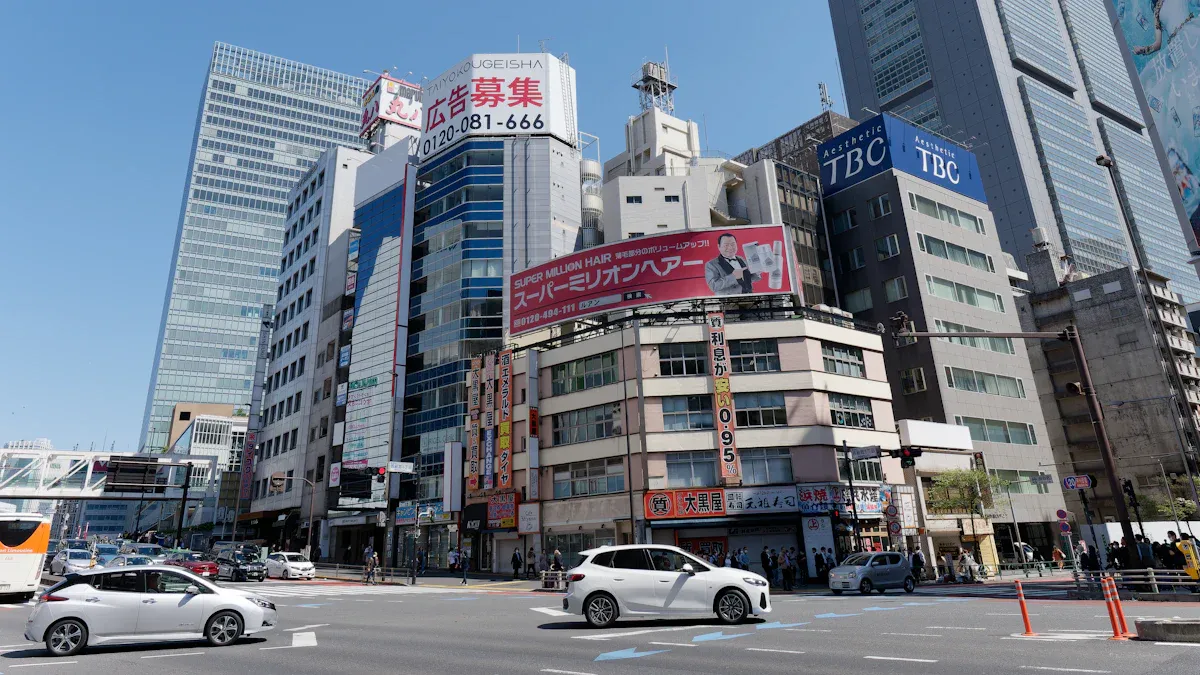
Image Source: unsplash
To successfully rent in Japan, you need to sequentially complete steps such as determining your needs, planning your budget, selecting rental websites, viewing properties, submitting applications, signing the contract, and moving in. Initial costs are generally high, with average monthly rents in major cities like Tokyo shown in the table below:
| City | Average Rent (JPY) |
|---|---|
| Tokyo City | 88,163 |
| Nagoya City | 72,000 |
| Osaka City | 67,500 |
| Kyoto City | 60,400 |
| Fukuoka City | 66,600 |
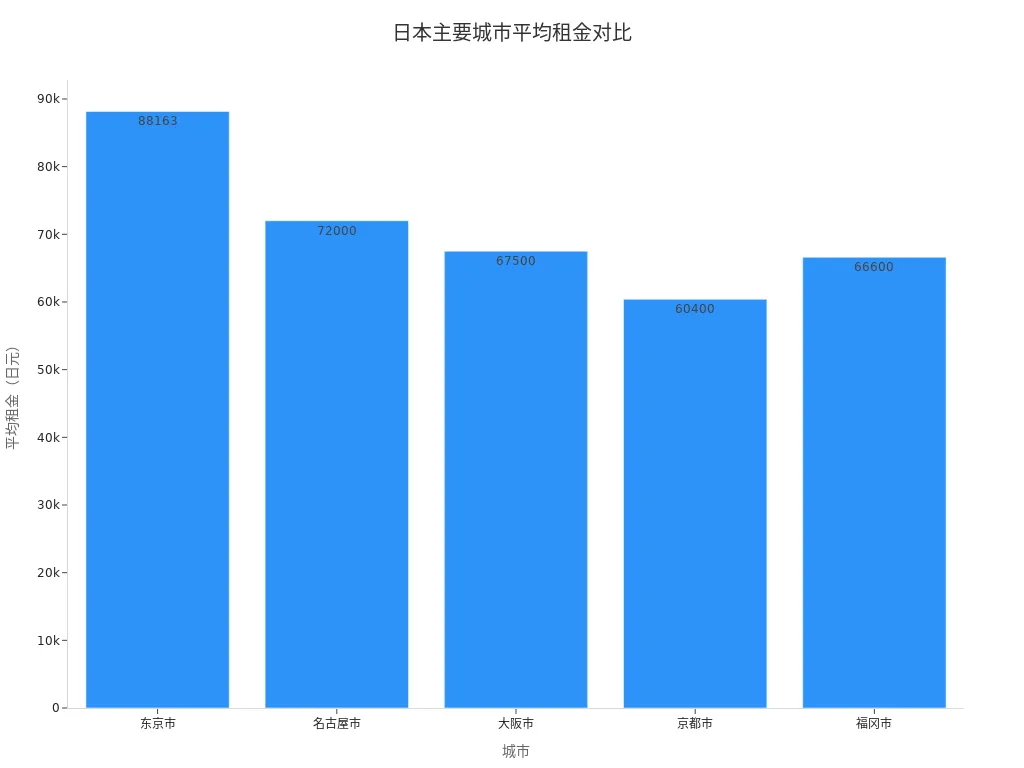
You will find that the rental process in Japan is more complex than in mainland China, with initial costs significantly higher than expected, so be sure to prepare in advance and beware of common pitfalls.
Key Points
- Before renting in Japan, clarifying your needs and budget is crucial. Ensure rent does not exceed 30% of your monthly income.
- Initial rental costs are high, typically requiring 4-6 months’ rent for deposits, key money, and agency fees.
- Choose suitable rental websites and agents, combining online and offline resources to improve efficiency and avoid pitfalls.
- When viewing properties, pay attention to lighting, ventilation, and the surrounding environment to ensure the living space suits your needs.
- Before signing, carefully review contract terms and understand all cost details to avoid hidden fees later.
Rental Process
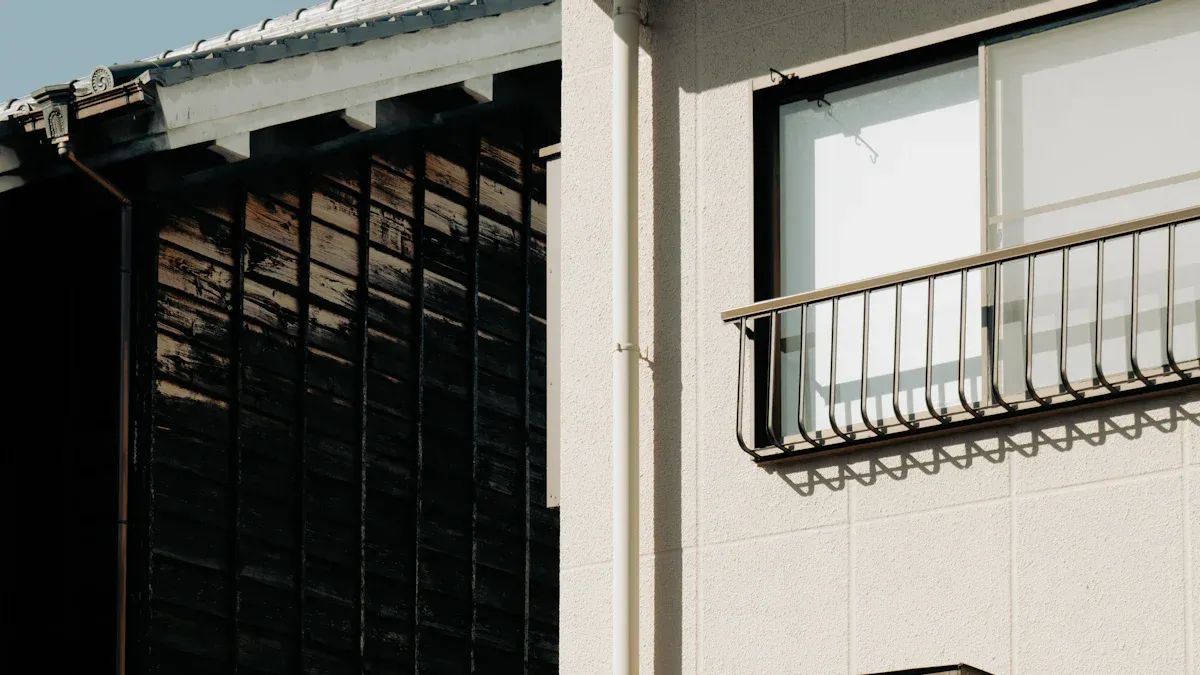
Image Source: pexels
To rent in Japan, you need to start preparing 3-4 weeks in advance. The process includes clarifying needs, setting a budget, searching for properties, viewing homes, submitting applications, undergoing review, signing the contract, and moving in. Each step impacts your rental experience and final choice. Below, we detail each step with specific operational suggestions and precautions.
Needs and Budget
You first need to clarify your rental needs. Consider the following questions:
- Which city or area do you want to live in?
- How much space do you need?
- Do you prioritize convenient transportation, amenities, or the age of the property?
Budget planning is critical. The initial costs of renting in Japan are high, including deposits, key money, agency fees, and the first month’s rent. You also need to account for ongoing expenses like utilities. It’s recommended to keep rent within 30% of your monthly income to ensure financial stability.
| City | Rent Range (USD) | Notes |
|---|---|---|
| Tokyo | $350–$700 | Higher in the city center, cheaper in suburbs. |
| Osaka | $420–$490 | Central areas are pricier, suburbs as low as $210. |
| Nagoya | $350–$280 | City center starts at $350, suburbs $210–$280. |
Tip: Initial costs (deposit, key money, agency fees, etc.) typically amount to 4-6 months’ rent, so prepare sufficient funds in advance.
Key factors affecting your budget include:
- Initial costs (deposit, key money, agency fees, first month’s rent, etc.)
- Ongoing costs (utilities, management fees, etc.)
- Location (city center or suburbs)
- Moving season (peak seasons have higher prices)
- Personal financial situation (rent should not exceed 30% of income)
Property Search Channels
You can search for properties through various channels, including:
- Online rental websites (e.g., SUUMO, HOME’S, CHINTAI)
- Offline real estate agencies
- Social platforms and expat/student groups
It’s recommended to combine online and offline channels. Online websites offer abundant information for filtering and comparison, while offline agencies provide in-person viewings and contract assistance. When choosing an agency, check their credentials and reputation to avoid unprofessional practices.
Note: Some properties are only available through agencies, which may charge a service fee equivalent to one month’s rent.
Property Viewing Process
After identifying potential properties, you need to schedule viewings. During viewings, pay attention to:
- Checking the property’s lighting, ventilation, soundproofing, and safety features
- Observing the surrounding environment, such as transportation, supermarkets, and convenience stores
- Inquiring about the property’s maintenance history and management
- Taking photos to document the property’s condition for later comparison
You can schedule multiple viewings in one go to improve efficiency. If you have questions during the process, consult the agent or landlord promptly.
Application and Review
Once you’ve chosen a property, you need to submit a rental application. Japanese landlords have strict review processes, typically requiring:
- Passport, residence card, or other ID proof
- Proof of income or student status
- Japanese bank account information
- Japanese phone number
- Guarantor information (usually a Japanese resident with stable income)
Many landlords require a guarantor, who must be a Japanese resident with a full-time job. This is a major hurdle for foreigners. Some agencies can assist with guarantor company services, but additional fees apply.
During the review, landlords assess your nationality, age, visa type, income level, and occupation. Generally, rent should not exceed 20%-25% of your income. If all documents are complete and your credit is good, the review process typically takes 3-7 days.
Signing and Moving In
After passing the review, you proceed to signing and moving in. The standard process is as follows:
| Item | Description |
|---|---|
| Deposit | Usually 1-2 months’ rent, partially refundable upon move-out. |
| Agency Fees | Generally one month’s rent. |
| Guarantor Fees | If using a guarantor company, fees range from 50%-120% of rent. |
| Fire Insurance | Mandatory, approximately $140 (two years). |
| Key Replacement Fee | Around $70-$140. |
| Contract Renewal Fee | About one month’s rent upon renewal. |
| Application Documents | Requires bank account proof, Japanese phone number, etc. |
Before signing, carefully review contract terms, focusing on details like deposits, key money, early termination, and damage compensation. After signing, you must pay all initial fees upfront. On move-in day, the agent will accompany you for a property inspection and key handover. Keep all payment receipts and the original contract.
Common issues include complex contract terms, high upfront costs, the need to notify multiple parties in advance, incomplete documentation, and difficulty finding a guarantor. Communicate with the agent in advance to ensure a smooth process.
By following the above steps, you can rent confidently in Japan. Each step requires thorough preparation and careful review to avoid common pitfalls and secure your ideal home.
Rental Costs
When renting in Japan, you need to understand various costs in advance to plan your budget effectively. Rental costs are divided into initial costs, monthly rent and ongoing expenses, hidden costs, and money-saving tips. Below, we break down each category to help you stay informed during the rental process.
Initial Costs
Initial costs are the one-time payments required when moving into a rental in Japan. These typically include deposits, key money, agency fees, fire insurance, and more. You need to prepare sufficient funds, as initial costs are often higher than expected.
| Cost Type | Description | Cost Range |
|---|---|---|
| Security Deposit (Shikikin) | Refundable amount to cover unpaid rent or property damage beyond normal wear. | 0 to 4 months’ rent |
| Key Money (Reikin) | Non-refundable payment to the landlord as a gesture of gratitude, paid at lease signing. | Approx. 1 to 2 months’ rent |
| Agency Fee | Commission paid to the real estate agent, usually 0.5 to 1 month’s rent plus consumption tax. | 0.5 to 1 month’s rent + tax |
| Fire and Tenant Liability Insurance | Mandatory in Japan, covers personal property damage and tenant liability. | Premiums vary by coverage |
| Total Initial Rental Costs | Initial move-in costs in Tokyo typically range from 4.5 to 5 months’ rent. | 4.5 to 5 months’ rent |
Initial costs vary significantly by city and property type. Refer to the table below for initial costs in major cities:
| City/Region | Average 1LDK Rent (Monthly, USD) | Typical Initial Costs (USD) |
|---|---|---|
| Tokyo (23 Wards) | $1,050 (central) $700 (city average) | ~$3,500-$5,250 |
| Osaka (City) | $700 (central) $560 (city average) | ~$3,360-$4,200 |
| Kyoto (City) | ~$630 (average) $770 (central) | ~$3,150-$4,620 |
| Fukuoka (City) | ~$560–$700 (central) | ~$2,800–$3,500 |
| Sapporo (Hokkaido) | $455 (central) $350 (city average) | ~$1,750–$2,450 |
| Regional Towns | ~$350 (e.g., Sendai suburbs) $210–$280 (rural areas) | ~$1,050–$1,750 |
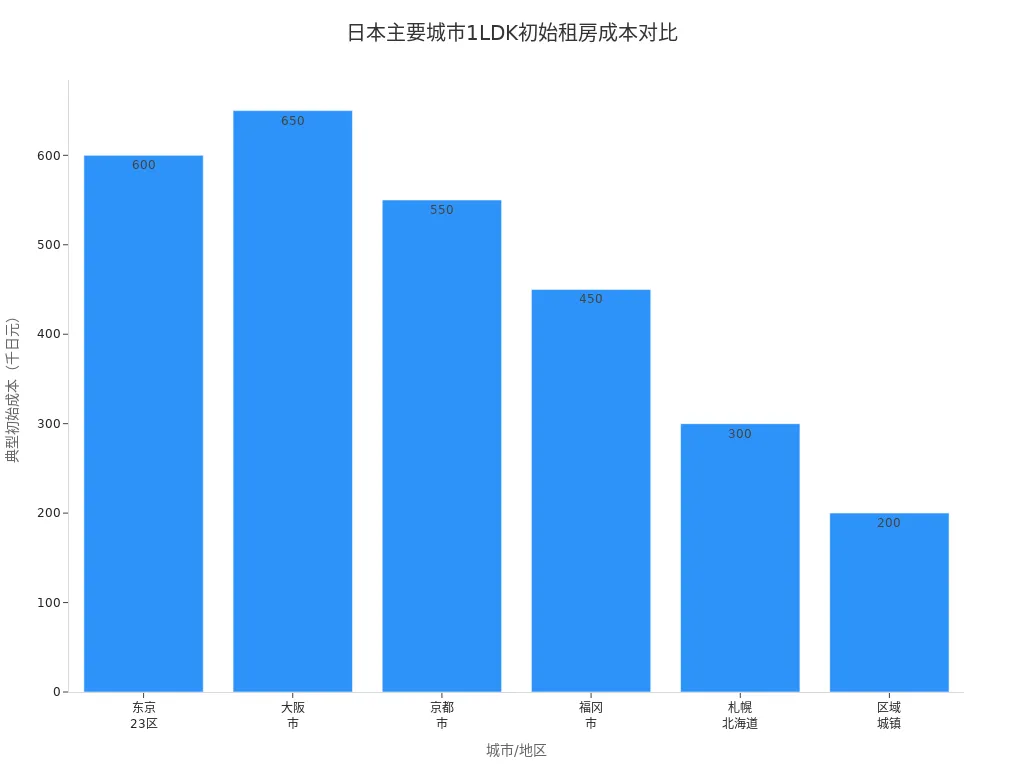
Tip: In cities like Tokyo and Osaka, initial costs typically range from 4-6 months’ rent. In Sapporo and regional towns, costs are lower, with some properties offering no deposit or key money.
Before signing, carefully review contract terms to confirm all cost details. Some properties offer promotions like “no key money” or “no deposit,” which can significantly reduce initial costs.
Monthly Rent and Ongoing Expenses
Monthly rent is the primary expense during your tenancy. Rent varies significantly by property type and city. Refer to the table below for average rents of common apartment types:
| Apartment Type | Average Rent (USD) |
|---|---|
| Studio Apartment | $420 - $700 |
| 1LDK Apartment | $700 - $2,100 |
| 2LDK and 3LDK Family Apartments | $1,050 - $3,500 or more |
In addition to rent, you need to cover utilities, internet, and property management fees. Below are typical ongoing expenses:
| Type | Average Cost (USD) |
|---|---|
| Single - 1K Apartment | $124 |
| Couple - 1LDK Apartment | $192 |
Specific monthly expenses you may encounter include:
- Electricity: Approx. $33
- Gas: Approx. $18
- Water: Approx. $33
- Internet: Approx. $41
It’s recommended to ask the landlord or agent whether property management fees are included in the rent. Some properties charge management fees separately, ranging from $30-$70/month.
Hidden Costs
In addition to explicit costs, there are several hidden costs in the Japanese rental process. You need to be aware of these to avoid unexpected expenses after moving in.
| Cost Type | Description | Cost Range |
|---|---|---|
| Lease Renewal Fee | Paid upon contract renewal, typically one month’s rent. | Approx. one month’s rent |
| Lock Replacement Fee | Cost to replace the previous tenant’s lock. | Approx. $140 |
| Fire Insurance | Cost for a two-year policy. | Approx. $140 |
Other potential hidden costs include:
- Cleaning Fee: Typically deducted from the deposit upon move-out, costing around $350-$490, with larger apartments incurring extra charges.
- Contract Creation Fee: Approx. $70-$140, usually non-negotiable.
- Pet Deodorization and Air Conditioner Cleaning Fees: If you have pets, landlords may charge extra.
- Renewal Fees: Upon contract renewal, you may need to pay about one month’s rent, common but not mandatory in contract terms.
Note: Some properties clearly list all fees in the contract, but some landlords or agents may not disclose them upfront. Ask detailed questions before signing to avoid disputes later.
Money-Saving Tips
When renting in Japan, you can reduce costs through various strategies. Here are common money-saving tips:
- Prioritize “no key money” or “no deposit” properties. Some landlords waive these fees to attract tenants, saving you hundreds of dollars.
- Try negotiating with the landlord or agent, e.g., reducing the deposit from two months to one or waiving the key replacement fee.
- Choose suburban or regional town properties. City center rents are high, while suburbs or smaller cities have lower rents and initial costs.
- Look for promotions, such as “first month free” or “moving subsidies.”
- Opt for shared housing or smaller units. Singles or students can consider shared apartments to split rent and utilities.
- Avoid moving during peak seasons. March-April is Japan’s moving peak, with higher rents and agency fees. Move during off-seasons to save costs.
- Before signing, ask for a detailed breakdown of all fees to avoid hidden costs.
Tip: You can open an account with a licensed Hong Kong bank for convenient rent payments and daily transactions. Some agents support international remittances, but fees are high, so inquire in advance.
By flexibly applying these money-saving tips, you can effectively reduce overall expenses and ease financial pressure. Thorough budget planning and understanding all costs are key to successful renting.
Recommended Rental Websites
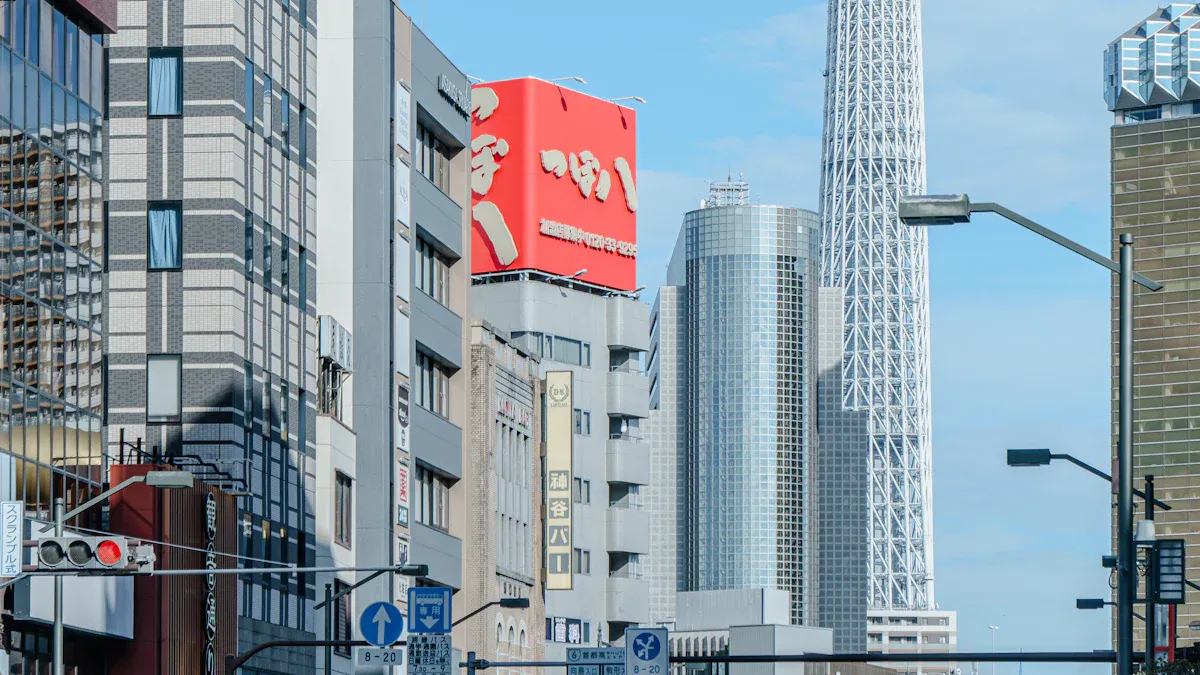
Image Source: pexels
Popular Rental Websites
When searching for a rental in Japan, you can use various websites. Below are popular rental websites commonly used by foreigners:
- SUUMO: Abundant listings, frequently updated, covering various property types nationwide.
- HOME’S: Powerful filtering features, ideal for quickly comparing different property types.
- CHINTAI: Offers diverse options with transparent pricing, suitable for budget-conscious renters.
- BEST-ESTATE.JP: Designed for foreign residents, supports multiple languages, and offers convenient online consultations.
- Asumirai: Supports English, Chinese, and Korean, assisting with the contract process.
- OYO LIFE: No deposit or key money required, supports online signing, ideal for short-term stays.
- OAKHOUSE: Focuses on shared apartments, suitable for social renters.
- SOCIAL APARTMENT: Combines social and private spaces, ideal for young people.
- MUJI×UR: Stylish design, no deposit or key money, suitable for quality-conscious renters.
- Youzi Liuxue: Tailored for international students, convenient for non-residents.
You can choose a rental website based on your needs and language proficiency.
Website Pros and Cons
When using Japanese rental websites, you’ll notice each has its strengths and weaknesses:
- Advantages: Abundant listings, rich filtering options, reasonable prices, and fast updates.
- Disadvantages: Some websites are Japanese-only, posing language barriers. Some landlords impose restrictions on foreigners, potentially leading to discrimination. Foreigner-oriented websites have fewer options and higher prices.
- Using local Japanese rental websites like SUUMO or CHINTAI offers more choices and lower prices. You can use Google Translate to assist with browsing and enhance your experience.
Tip: When browsing rental websites, prioritize platforms with multilingual support to reduce communication barriers.
Choosing an Agent
When renting in Japan, selecting a reliable agent is crucial. Here are selection criteria:
- Choose a licensed real estate agent.
- Evaluate the agent’s experience in your target area.
- Confirm the agent’s experience with traditional or vacant properties.
- Ask about the number of properties they’ve closed in the past year.
- Understand which platforms the agent uses to market properties.
- Verify if the agent has experience serving international clients.
- Learn how the agent handles negotiations and legal documents.
Combining online rental websites with offline agency services can improve efficiency. Online platforms help you filter properties, while offline viewings and signings help you avoid pitfalls and complete the rental process smoothly.
Property Types and Avoiding Pitfalls
Property Types
When renting in Japan, you’ll encounter various apartment types, each suited to different renters. Refer to the table below for a quick overview of common property types and their features:
| Apartment Type | Features | Suitable Renters |
|---|---|---|
| 1K | One room with a kitchen, compact, fully functional. | Single residents, international students, budget-conscious renters |
| 1R | One room with a bathroom and toilet, simple layout. | Single residents, short-term renters |
| 1DK | One room with a dining area and kitchen, more spacious. | People who cook often, work-from-home individuals |
| 1LDK | One room with a separate living room, dining area, and kitchen. | People who entertain, small families |
| 2LDK | Two bedrooms plus living, dining, and kitchen areas. | Small families |
| 3LDK | Three bedrooms plus living, dining, and kitchen areas. | Larger families |
| 1SLDK | One room with a separate study. | Single residents, those needing a workspace |
| 3SLDK | Three bedrooms plus a separate study. | Larger families |
You can choose a property type based on your lifestyle and budget. For example, single individuals often opt for 1R or 1K, while families prefer 2LDK or 3LDK.
Property Selection Tips
When selecting a property, consider more than just type and price. The following factors directly impact your living experience:
- Lighting and Orientation: South-facing rooms are bright all day, ideal for drying clothes but hotter in summer and pricier. East-facing rooms get morning sunlight and are cooler in summer. West-facing rooms are sunny in the afternoon, with lower winter heating costs. North-facing rooms are cheaper but colder in winter.
- Transportation Convenience: Properties near subway or bus stations are more desirable, offering shorter commutes and convenience.
- Nearby Amenities: Access to supermarkets, convenience stores, hospitals, and schools enhances comfort.
- Indoor Washing Machine and Internet Services: Some apartments include indoor washing machines and flexible internet services, improving quality of life.
- Building Age and Safety: Newer buildings are more comfortable, while older apartments are cheaper but may have outdated facilities. Also, check earthquake preparedness.
Apartment rents are primarily influenced by location, building age, size, and orientation. City center properties are the most expensive, and proximity to the nearest station is critical. Choose based on your commuting needs and lifestyle.
Avoiding Pitfalls
When renting in Japan, you may encounter common pitfalls. Be proactive to avoid them:
- High Upfront Costs: Some properties charge multiple fees, including deposits, key money, and agency fees. Ask for a detailed breakdown of all costs before signing to avoid unexpected expenses.
- Strict Document Requirements: Many landlords require a Japanese bank account, proof of stable income, and a Japanese phone number. If new to Japan, consider shared housing or seek professional agency assistance to ease the process.
- Barriers for Foreigners: Some landlords are hesitant to rent to non-residents, and single individuals, seniors, or LGBTQ+ renters may face additional challenges. Prioritize foreigner-friendly properties or multilingual agents.
- Complex Contract Terms: Japanese rental contracts are detailed, with terms on early termination and damage compensation requiring careful review. Ask an agent or a Japanese-speaking friend to assist with interpretation.
- Choosing a Suitable Payment Method: Some agents accept rent payments via licensed Hong Kong bank accounts, which have lower fees and are secure.
Before renting, consult professionals or experienced renters to understand common issues and solutions. This can minimize hassles and ensure a smooth move-in.
Documents and Japanese Language
Document Checklist
When renting in Japan, you need to prepare required documents in advance. Requirements vary by landlord and agent, but typically include:
| Required Document | Description |
|---|---|
| Passport | Provide a color copy of your passport. |
| Residence Card | Proves your legal status in Japan. |
| Proof of Income or Employment Contract | Includes pay stubs, employment letters, or certifications. Students may need parental or guardian income information. |
| Japanese Bank Account | Most cases require a Japan Post Bank account; some agents accept licensed Hong Kong bank accounts. |
| Guarantor or Guarantor Company | Landlords typically require a Japanese guarantor or guarantor company service fees. |
| Visa Page | Provide copies of your visa page or residence card (front and back). |
When submitting applications, prepare all copies and digital versions in advance to speed up the review process and reduce waiting time.
Common Vocabulary
Knowing key Japanese rental terms can make communication with agents or landlords smoother. Here are common terms:
- 賃貸(ちんたい): Lease
- 契約(けいやく): Contract
- 礼金(れいきん): Key Money
- 敷金(しききん): Deposit
- 管理費(かんりひ): Management Fee
- 保証人(ほしょうにん): Guarantor
- 火災保険(かさいほけん): Fire Insurance
- 更新料(こうしんりょう): Renewal Fee
- 退去(たいきょ): Move-Out
- 申込書(もうしこみしょ): Application Form
Memorize these terms and use them proactively during viewings and signings to improve communication efficiency.
Communication Tips
Your communication approach directly affects your rental experience. Consider these methods:
- Prepare all documents in advance and clearly explain your identity and needs to the agent.
- If unfamiliar with Japanese, use translation apps or bring a Japanese-speaking friend.
- Before signing, ask detailed questions about all fees and contract terms to avoid missing critical information.
- If something is unclear, ask the agent to explain or request a Chinese or English contract version.
- Choose agents or websites with multilingual support to reduce communication barriers.
During the rental process, proactive communication and thorough document preparation can help you pass reviews smoothly and move into your ideal home quickly.
Move-Out Process
Termination Notice
When moving out in Japan, you must first notify the property management company or landlord in advance. Most contracts require at least one month’s written notice. You can submit this via email or written document. Carefully check the contract’s specific notice period to avoid extra fees due to delays. After notification, arrange a move-out date with the landlord or agent to facilitate subsequent moving and inspection plans.
Tip: Keep all communication records and documents as evidence for deposit settlements.
Move-Out Inspection
On move-out day, you need to conduct a property inspection with the property manager or landlord. The inspection covers walls, floors, the kitchen, and the bathroom. Ensure the property has no significant damage or leftover items. The manager will assess whether deposit deductions are needed for repairs. Clean the property in advance and fix minor damages to reduce deduction risks. After the inspection, the manager will issue a move-out report and explain the deposit settlement process.
Common move-out steps include:
- Notify the property manager or landlord, adhering to the contract’s notice period.
- Schedule a move-out inspection to ensure the property is in good condition.
- Cancel utilities like water, electricity, and gas.
- Conduct a final inspection on moving day to confirm all items are removed.
- Settle the deposit, with any necessary repair costs deducted, and receive the remaining amount.
During deposit settlement, you typically receive the refund 1-2 months after moving out. You can opt to receive it via a licensed Hong Kong bank account for convenient fund management.
Furniture Handling
When moving out, you need to handle furniture and appliances properly. Some apartments allow leaving certain furniture, but most require complete removal. Contact a moving company in advance to arrange furniture transport or disposal. Some cities offer large-item garbage collection services, which you can schedule for pickup. Ensure no items are left behind to avoid cleaning fees. Before moving, take photos of the property’s condition as evidence for deposit settlement.
During the move-out process, properly managing notifications, inspections, and furniture disposal ensures a smooth move and maximizes deposit refunds.
When renting in Japan, plan the process in advance and prepare for initial and ongoing costs. Combine your needs with flexible use of rental websites and agents to avoid common pitfalls.
- Clarify needs and budget, preparing all documents in advance.
- Understand all costs in detail to manage expenses effectively.
- Focus on property type, transportation, and nearby amenities to enhance your living experience.
It’s recommended to stay updated on Japan’s rental policies and market trends, adjusting your strategy to ensure a smooth move-in.
FAQ
Can I use a mainland China bank account to pay rent?
You typically need a Japanese bank account. Some agents accept licensed Hong Kong bank accounts for rent payments. Confirm payment methods and fees in advance.
What if I struggle to find a guarantor as a foreigner?
You can use a guarantor company service. Agents can assist with applications, with fees ranging from 50%-120% of monthly rent, helping you pass reviews smoothly.
What are the consequences of early contract termination?
Early termination may incur penalties. Some contracts require one month’s notice. Review contract terms carefully to avoid extra costs.
How do I handle large furniture and appliances when moving?
Contact a moving company or schedule city garbage collection services. Plan disposal in advance to avoid cleaning fees upon move-out.
How can I avoid hidden costs during renting?
Ask for a detailed breakdown of all fees before signing. Keep communication records and have unclear terms explained by the agent promptly.
You have mastered the entire renting process in Japan, the high initial costs (deposit, key money), the common pitfalls, and the essential document preparation. You clearly understand the complexity of the Japanese rental system, and how fast, efficient cross-border fund transfers are crucial for passing screening and paying initial fees smoothly. Traditional international remittances are expensive and slow, and any capital delay could cause you to miss out on an ideal property or put you at a disadvantage during the contract signing.
When facing the strict financial requirements of Japanese landlords and agents, you need a FinTech platform that can bypass geographical and traditional banking restrictions, provide real-time exchange rates, and ensure same-day fund arrival.
BiyaPay is the ideal solution for your Japanese rental fund needs. We offer real-time exchange rate inquiry and conversion for fiat currencies, with remittance fees as low as 0.5%, and zero commission for contract limit orders, helping you maximize cost control. With BiyaPay, you can seamlessly convert between various fiat and digital currencies and trade global markets, including Stocks, all on one platform. There is no need for a complex overseas bank account, and you can enjoy same-day fund remittance and arrival. Click the Real-time Exchange Rate Inquiry now, and BiyaPay for quick registration, and utilize peak capital efficiency and low costs to ensure your rental journey in Japan is efficient and smooth!
*This article is provided for general information purposes and does not constitute legal, tax or other professional advice from BiyaPay or its subsidiaries and its affiliates, and it is not intended as a substitute for obtaining advice from a financial advisor or any other professional.
We make no representations, warranties or warranties, express or implied, as to the accuracy, completeness or timeliness of the contents of this publication.




Contact Us
Company and Team
BiyaPay Products
Customer Services
is a broker-dealer registered with the U.S. Securities and Exchange Commission (SEC) (No.: 802-127417), member of the Financial Industry Regulatory Authority (FINRA) (CRD: 325027), member of the Securities Investor Protection Corporation (SIPC), and regulated by FINRA and SEC.
registered with the US Financial Crimes Enforcement Network (FinCEN), as a Money Services Business (MSB), registration number: 31000218637349, and regulated by FinCEN.
registered as Financial Service Provider (FSP number: FSP1007221) in New Zealand, and is a member of the Financial Dispute Resolution Scheme, a New Zealand independent dispute resolution service provider.



















